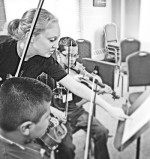Title

Marcus Ryan Pyle (second from left) persuaded his old friend Aryc Lane (left), a cellist who teaches at a local high school, and Morehouse (far right) to join him as the two other full-time faculty members at ChamberWorks. Here they pose with one of the students.
Leonard Bernstein once said, “For great things to happen you need a plan and not quite enough time.” In 2010, as a sophomore at the Royal Academy of Music in London, I decided to create a two-week summer music camp in my hometown, Dallas. As the year progressed, it seemed more and more unlikely that ChamberWorks would take off, but it did. That year we had 13 musicians; this year I had to set a cap of 30.
Body
At ChamberWorks, we provide students with individual attention while giving them a snapshot of what majoring in music would be like. Each day, students participate in chamber studio and chamber orchestra as well as courses on discussing music, ear training, music theory, and some other special-interest classes—it’s a jam-packed schedule that Juilliard students can empathize with.
Unlike most music camps, we strive to educate the entire being of these future musicians from the purely technical aspects of playing to nurturing the desire to be philanthropic and to explore unconventional avenues of music-making. While most of the campers aspire to be musicians (at least for now), we don’t turn away the ones who want to be architects, doctors, or even tattoo artists. Music helps hone skills necessary to be successful in all of those careers.
Though students can—and often do—come in earlier, chamber studio begins the official day at 9 a.m.—not 9:01—and I lock the door to reinforce the importance of punctuality. After a few days, the students are teasing me, “Maestro P., don’t forget to lock the door.” Chamber studio encompasses all the skills they learn in ChamberWorks. Not only do they have to be proficient enough on their instrument to practice their part but they must also be adept at leadership and at articulating criticism—and taking it. They also have to learn creative problem solving and how to plan performance opportunities, all topics we covered in chamber studio.
On the first day of camp, one group named themselves the G-Clefs and decided to prepare string-quartet arrangements of Bach’s “Brandenburg” Concerto No. 3 and “Jupiter” from Holst’s The Planets. “The music is harder than I’ve ever played before,” 12-year-old violinist Eli Lewis said, “but I like it.”
After the first day, though, first violinist Lauren Jones, 12, was out with a fever and headache and ended up missing the rest of the first week, and when she got back the following Monday, the faculty and the other G-Clef members weren’t sure what to expect. But once they started, it all fit together. Turned out that cellist Devon Evertson, 13, had gone to Lauren’s house and spent about four hours teaching her the theory she had missed and rehearsing her parts with her. This is precisely the sort of mentality that our campers embody and that we reinforce. Teachers can teach you how to practice, what to listen for, and how to listen, but the student has to actually do the practicing.
One of my main goals was to allow the students freedom to explore and to present different avenues that music can lead them down; to that end they can take classes in conducting, composition, world music and improvisation, or performance success. CalArts violinist Stephanie Moorehouse taught World Music and Improvisation, which began with Asian music and ended up with pop and jazz. She started by briefing the students on theory and instrumentation, and then they had a chance to improvise with all sorts of exotic instruments (“Who wants the goat hooves shaker?”).
We also had after-camp master classes on everything from Web site construction to yoga for musicians and mask acting. It surprised me—and the other faculty members and interns—the extent to which students wanted to stay for that extra hour of camp. One of the youngest students, 10-year-old violinist Omar Vasquez, attended one called Applying to College and Majoring in Music—and though he’d only just finished fifth grade, he had several prospective schools in mind.
Students willing to put in that extra time may have meant longer days for me and the other faculty members and interns—we often didn’t leave until 9 p.m., but that’s part of our mission. Teaching is based on reciprocity. We’re excited about working with this new generation of musicians and helping them hone their purpose, passion, and curiosity.





